|
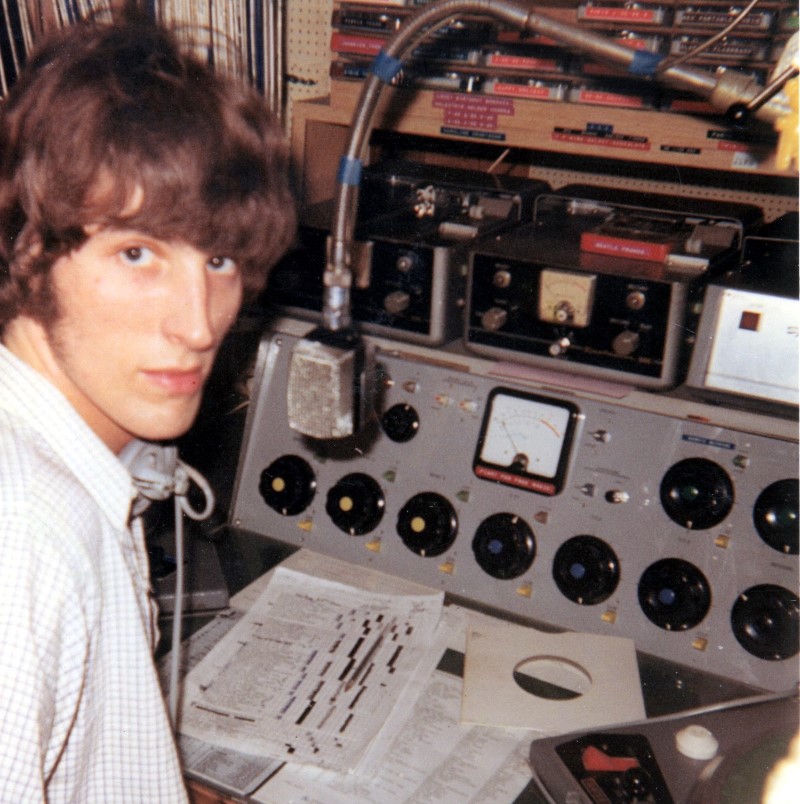
|
|
Johnnie Walker in the studio of Radio Caroline South in 1967. Photo courtesy of Sheridon Street.
|
Soon after the Pirate Radio Hall of Fame was launched back in 2000, we set up a Guestbook in which visitors to the site could post their comments. We asked everyone who signed to give us the name of their
favourite offshore disc-jockey. Right from the start one name stood out and has remained the most popular ever since. Your favourite, by a considerable margin, has been - and is still - the one and only Johnnie Walker who has
sadly died at the age of 79.
|
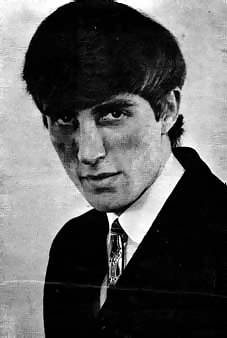
|
|
Radio England's promotional photo of Johnnie.
|
Johnnie was born Peter Waters Dingley on Good Friday, 30th March, 1945. (Waters was his mother's maiden name.) He grew up in Solihull where he was introduced to the joys of rock'n'roll by his older brother John.
As a youngster he did odd jobs like washing cars at a local garage to earn the cash to buy records. His first was Let There Be Drums by Sandy Nelson.
He was educated at Solihull public school but was not a particularly avid student. His only interests at that age were cars and pop music. In 1960, aged 15, he got a job during the school holidays, working for a few weeks in
the polishing shop of a brass foundry. He earned enough money to buy a Philips tape recorder and was soon recording his own programmes, just for fun, in his bedroom. At the end of that summer he returned to school to do his O-levels.
He failed them all. It was time to find a job.
With his interest in cars, the obvious place to look was the automotive industry and, thanks to a family connection, he was offered an apprenticeship at a garage in Gloucester. After 18 months there he managed to find a job back
home in Solihull as a car mechanic, with the chance of promotion to salesman.
One night Radio Luxembourg DJ Don Wardell was making an appearance at the Locarno, the local Mecca Ballroom. Peter managed to have a few words with him and asked how he could go about getting a job on the radio. Don said he
should contact a producer called Derek “Eggy” Ley. This did lead to Peter getting an audition in London but things did not go well. The rejected broadcaster returned home with Eggy's words ringing in his ears:
“you'll never be a disc-jockey as long as you live”.
Determined to prove him wrong, Peter started pestering the manager of the Locarno to give him a gig playing records. Eventually he did. It went well. Other bookings followed, so many in fact that his day-job began to suffer.
Peter's boss at the garage gave him an ultimatum: car salesman or DJ? Thankfully for us, he picked the latter. In April 1966 Peter Dingley, better known around the Solihull area as “Pete Dee”, became a full-time
disc-jockey.
The very next day a newspaper article appeared, reporting that a new US-owned radio ship was on the way. It said that the station would have American DJs so Pete didn't think any more about it but that night, at a
gig at the Navigation Inn, a punter came up to him. The man had seen the same article and urged Pete to apply, saying “they are bound to want one or two English guys”.
On Monday morning Peter phoned the Daily Mirror. He spoke to the journalist who had written the article and discovered that the station bosses were staying at the Hilton Hotel in London. He called them. It seems the man at the
Navigation Inn had been correct. They were looking for some English DJs. He was asked to submit a tape. That night Pete put one together with the help of a friend but, instead of sticking it in the post, decided to deliver it
in person. He turned up at the Hilton where they listened to it, asked him to read a news bulletin, and offered him a job. There was just one catch: he was going to have to change his name. He couldn't be Pete Dee any more. They
had already signed a Roger Day. The names were too similar. It was suggested he choose a name from a tape of American radio jingles so that he could use one of the jingles himself. He liked a Sonovox
jingle “He's in, Johnnie Walker, he's on”. So that was it. Peter Dingley was now Johnnie Walker.
 Johnnie's jingle (duration 7 seconds)
Johnnie's jingle (duration 7 seconds)
The new radio ship hosted two stations: Britain Radio was easy-listening and “Swinging” Radio England fast-moving Top 40. Johnnie was overnight DJ on the latter and read the news on Britain Radio's
Breakfast Show. Programme Director Ron O'Quinn taught him the ways of American pop radio: talk as if you are speaking to just one person and always sound upbeat and happy. Radio England was not well
run and conditions on the ship were pretty unpleasant, but as the weeks passed Johnnie developed his skills and built up something of a late night following.
 Johnnie Walker on Radio England around 4 o'clock one morning in September or October 1966. This was recorded in Munich by Helmut Slawik and shared on the Radiotrefpunt (radio meeting point) forum by Ben. Our thanks to them both (duration 1 minute 11 seconds)
Johnnie Walker on Radio England around 4 o'clock one morning in September or October 1966. This was recorded in Munich by Helmut Slawik and shared on the Radiotrefpunt (radio meeting point) forum by Ben. Our thanks to them both (duration 1 minute 11 seconds)
The Britain Radio/Radio England ship was serviced by the same Offshore tendering company which looked after Radio London and Radio Caroline South. One day Johnnie was on the tender as it was collecting people from
Caroline. Their morning DJ Mike Ahern was out on deck and Johnnie heard him shout “tell that Johnnie Walker we love his shows. He should come and work for us.”
|
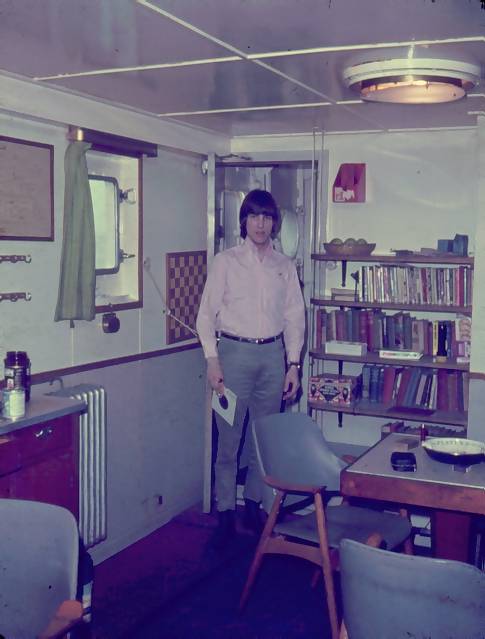
|
|
Johnnie on Radio Caroline South. Photo taken by engineer Morris Brown and shared with us by Byron Richards.
|
One day Johnnie spotted an article in a local paper. It said that one of the two stations on the ship was to be replaced by a Dutch service. Johnnie guessed that it would be Radio England that would close. He
needed to find a new job. He wasn't due for shore leave but grabbed his bag and jumped on the tender. That night he turned up at a Caroline Disc Night at the Wimbledon Palais. He spoke to Senior DJ Tom
Lodge who told him he needed to see Caroline's new consultant, Terry Bate, who had just been appointed to revamp the output. The next day Johnnie was at Caroline House. He spoke to Bate, was introduced to station boss
Ronan O'Rahilly, and was offered a position on their South ship.
 Johnnie sitting in for Keith Hampshire on Keefers' Uprising on Caroline South, 15th December 1966 (duration 1 minute 59 seconds)
Johnnie sitting in for Keith Hampshire on Keefers' Uprising on Caroline South, 15th December 1966 (duration 1 minute 59 seconds)
Initially Johnnie was the ‘swing jock’ on Caroline, covering for whoever was on shore leave. He particularly enjoyed doing Rick Dane's 9pm-midnight show so he was delighted
when Rick left the ship and it was given to him. Although he still remembered Ron O'Quinn's advice of talking to the audience as if they were one individual, he was able to drop the rather forced jollity that Radio England demanded
and be more himself. The audience loved it. Each listener felt that Johnnie was talking just to them. The show became essential listening. He introduced a number of well-remembered features: Ten O'Clock Turn On was Johnnie
playing a new favourite record twice; Frinton Flashing was when he had a “conversation” with people listening in cars on the shoreline - he spoke to them, they replied by flashing their headlights; he issued Kiss
in the Car licences to any young couple listening in their car who could snog for the entire duration of a record! and every night at 11pm he would say goodnight to a chosen listener with Percy Sledge's
Warm and Tender Love. Johnnie was at the forefront of the mid-sixties soul boom, championing Otis Redding in particular. His theme tune was Duane Eddy's
Because They're Young.
 Johnnie reading a Kiss-in-the-Car letter from a listener on Radio Caroline South on 27th December 1966. Audio courtesy of The Offshore Radio Archive (duration 3 minutes 33 seconds)
Johnnie reading a Kiss-in-the-Car letter from a listener on Radio Caroline South on 27th December 1966. Audio courtesy of The Offshore Radio Archive (duration 3 minutes 33 seconds)
 Johnnie sitting in for Dave Lee Travis on the Caroline Countdown chart show, 7th January 1967. This clip is taken from a recording on the “Johnnie Walker & Robbie Dale: Their Offshore
Radio Years” mp3-DVD (duration 3 minutes 2 seconds)
Johnnie sitting in for Dave Lee Travis on the Caroline Countdown chart show, 7th January 1967. This clip is taken from a recording on the “Johnnie Walker & Robbie Dale: Their Offshore
Radio Years” mp3-DVD (duration 3 minutes 2 seconds)
Ever since Radio Caroline started in 1964, the Government had been threatening to legislate against offshore radio and in August 1967 it finally happened. In the week before its introduction Johnnie and his colleague
Robbie Dale were on shore leave. On Friday 11th they hosted a gig starring chart-toppers Procol Harum at the Bal Tabarin Ballroom in Bromley, Kent. The packed crowd chanted their support for the two DJs,
as did the huge throng who turned up at Liverpool Street station to see them off as they returned to the ship on Monday morning, 14th August. The new law was to come into effect at midnight. When they got back to the ship, excited
about the challenge, they found everyone else was going home. They were quitting. Johnnie went on the air at 2 as the tender took his former ship-mates back to land. At 3pm he was joined in the studio by Robbie, who had just heard
Radio London close down. At ten past 3, the only other broadcaster on the ship at that time, Ross Brown, took over. At 6 it was Robbie, at 9 Johnnie and then at midnight, as the station became an outlaw,
Johnnie and Robbie took Caroline into a new era, that of Radio Caroline International. No one really knows how many people were listening that night but Johnnie's moving and inspiring broadcast must have been heard by millions.
 Johnnie on Radio Caroline South at midnight on 14th August 1967 (duration 1 minute 35 seconds)
Johnnie on Radio Caroline South at midnight on 14th August 1967 (duration 1 minute 35 seconds)
At the end of September the BBC's answer to the pirates, Radio 1, began broadcasting. For a time Johnnie moved to Caroline South's Breakfast Show - the obvious place to schedule the station's biggest star - but
he wasn't a natural for that early spot and soon returned to his true home, 9pm-midnight.
It was a tough winter, with bad weather, rough seas and irregular tenders. The Caroline DJs felt very isolated. On occasions Johnnie made his feelings known on air. This might not have gone down well with his bosses but it only
strengthened the bond between him and his listeners. We knew what he and his colleagues were going through.
 Johnnie Walker describing some of the difficulties the DJs were dealing with on Radio Caroline South. The sea is too calm! The recording was kindly provided by Steve England (duration 2 minutes
57 seconds)
Johnnie Walker describing some of the difficulties the DJs were dealing with on Radio Caroline South. The sea is too calm! The recording was kindly provided by Steve England (duration 2 minutes
57 seconds)
 Johnnie sounding a lot more upbeat, opening what turned out to be his penultimate show on Caroline South, 1st March 1968. This clip is taken from a longer recording available from www.azanorak.com. Our thanks to Ray Robinson (duration 2 minutes 36 seconds)
Johnnie sounding a lot more upbeat, opening what turned out to be his penultimate show on Caroline South, 1st March 1968. This clip is taken from a longer recording available from www.azanorak.com. Our thanks to Ray Robinson (duration 2 minutes 36 seconds)
 In a documentary for GLR, Johnnie remembered having to play some of the payola plug records which kept Radio Caroline going, one in particular (duration 1 minutes 6 seconds)
In a documentary for GLR, Johnnie remembered having to play some of the payola plug records which kept Radio Caroline going, one in particular (duration 1 minutes 6 seconds)
|
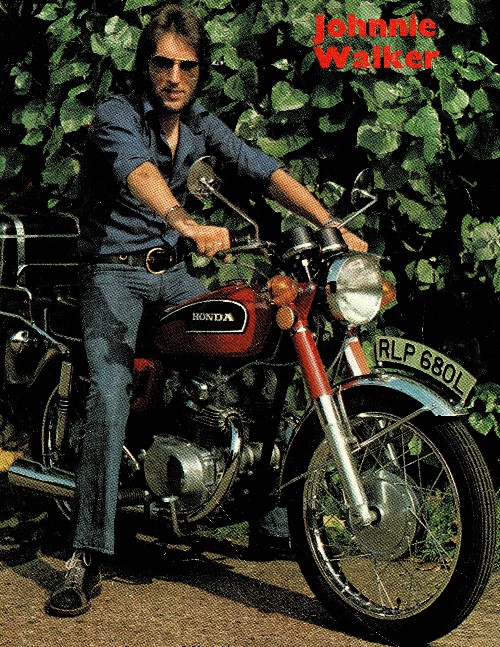
|
|
Johnnie loved his motorbikes. This photo from ‘Deejay & Radio Monthly’ dates from his time at Radio 1.
|
On 3rd March 1968 the two Caroline ships were silenced. Wijsmuller, the company which crewed and supplied them, hadn't been paid for their services so they grabbed the only available asset, the two broadcasting
vessels, and towed them into harbour. Johnnie was now out of work. (You can read his memories of that fateful night here.)
He took a temporary job as a van driver but he wasn't totally forgotten by the music business. He was booked to compère an Aretha Franklin concert at the Finsbury Park Astoria. The boss of Elektra Records in Britain, Clive
Selwood, offered to sound out the BBC on Johnnie's behalf. This led to a meeting and, after a year ashore, Johnnie made his debut on Radio 1 hosting a Saturday afternoon show. This led to a daily programme (9-10am) and then to
weekday lunchtimes. This show is particularly well-remembered. Johnnie had always been a music-lover and initially was able to champion a number of records which wouldn't normally have been played on the BBC including Lou Reed's
Walk On the Wild Side. However he wasn't happy about having to include some of the more commercial pop records of the day, and made his opinion known. When his contract
came up for renewal in July 1976 he was offered another two year deal but only on condition he stuck to the playlist and stopped featuring album tracks. He couldn't bear to give up his musical freedom and chose to quit, leading
the boss of Radio 1 Derek Chinnery to utter the memorable words “the trouble with you Johnnie is that you're too into the music, man”.
 Johnnie Walker opening his first show for Radio 1, 26th April 1969. This clip is taken from a recording shared on Mixcloud by Fred Bunzl. Our thanks to him (duration 57 seconds)
Johnnie Walker opening his first show for Radio 1, 26th April 1969. This clip is taken from a recording shared on Mixcloud by Fred Bunzl. Our thanks to him (duration 57 seconds)
 Johnnie ending his last lunchtime show for Radio 1, 2nd July 1976. This clip is taken from a remastered recording available on www.azanorak.com. Our thanks to Ray Robinson
(duration 3 minutes 40 seconds)
Johnnie ending his last lunchtime show for Radio 1, 2nd July 1976. This clip is taken from a remastered recording available on www.azanorak.com. Our thanks to Ray Robinson
(duration 3 minutes 40 seconds)
It couldn't have come at a better time: the free-form San Francisco rock station, KSAN, got in touch. They invited Johnnie to take over their Breakfast Show for three weeks while the usual presenter was on vacation.
This proved successful and he was offered a full-time job but sadly he had to decline because he had to get back to his wife and two children in London. Later he brought the family over with him and, living in a mobile home, they
drove across the States, ending up in San Francisco where he hoped to return to KSAN. Unfortunately problems getting a green card, and a change of management at the station, meant this didn't happen. It was a tough time. He did a
number of different jobs including some radio work but also gas station cashier, as well as running a punk music club which was closed down by the police.
|
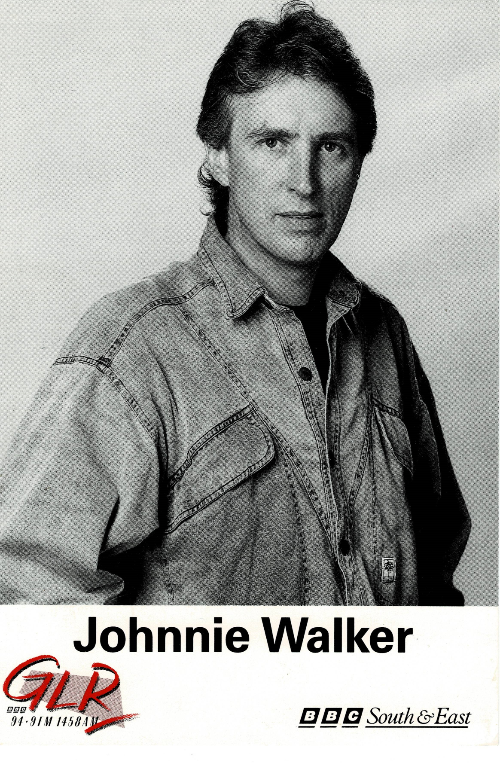
|
|
Johnnie Walker promo photo for GLR. Copyright BBC.
|
In 1982 he saw an article saying Radio Caroline was about to return from a new ship. He made a few phone calls, confirmed that it was true, and decided it was time to come home. However, when he got back to Britain
he discovered that the article had been somewhat optimistic. Caroline was planning to return but it was nowhere near ready. A record plugger friend suggested he speak to Dave Cash, then running Bristol's
Radio West. This led to Johnnie getting a show there, moving 18 months later to Wiltshire Radio. A few months after that, the two stations merged under the name GWR.
All the new independent local radio stations which had started up in Britain since 1973 broadcast on FM but the BBC's Radio 1 was still only on AM. Then in 1987 the Corporation decided that, as Radio 2 had sports coverage
on Saturday afternoons, it didn't need the use of the FM transmitters. Radio 1 could have them for a few hours. This led to Johnnie being signed up to host the Saturday Stereo Sequence. He was back on Radio 1.
But 18 months later he was off again, tempted to join a Richard Branson-backed venture called Radio Radio. This operation signed a number of big name broadcasters and offered a syndicated service to local stations around the
country. Radio Radio was short-lived but, when it ended, a number of the staff, including Johnnie, joined GLR, the revamped BBC local station for London where he was reunited with his old Caroline colleague
Tommy Vance.
 Johnnie opens GLR on the radio and the local TV programme London Plus, 25th October 1988. Audio from YouTube (duration 32 seconds)
Johnnie opens GLR on the radio and the local TV programme London Plus, 25th October 1988. Audio from YouTube (duration 32 seconds)
His GLR programmes were much-admired and after a couple of years he was poached by the BBC's new Radio 5. He also returned to Radio 1's Stereo Sequence but, following a change of management, the show was dropped.
He did some programmes for GWR and LBC then Radio 2 beckoned. Initially they gave him a Saturday afternoon slot but he later replaced John Dunn on weekday afternoons. Johnnie was to stay with Radio 2 for the rest of his career,
although it was not always smooth sailing.
|
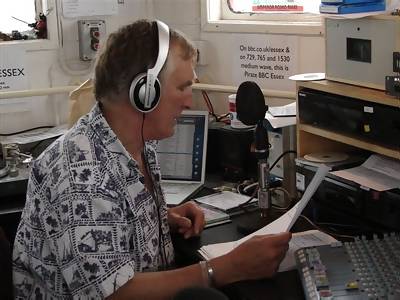
|
|
Johnnie on the air at Pirate BBC Essex in 2007. Photo by Duncan Johnson.
|
In April 1997 the tabloid News of the World published an article accusing Johnnie of dealing drugs. He was immediately dropped from the Radio 2 schedule. The police charged him with possessing and
dealing cocaine. Johnnie admitted he had a drug problem but vehemently denied dealing. He went into rehab and when the case came to court the dealing charge was dropped. He pleaded guilty to possession and was fined £2,000
plus costs. He wasn't sure how his listeners would respond to this but was reassured when he attended a concert by The Mavericks, a band he had supported on air. When the singer announced that Johnnie was there, the entire
audience of the Royal Albert Hall rose to their feet and applauded him. Radio 2 was also aware of how well-loved he was. Johnnie was soon back on Drivetime.
In 2003 he had to take time off after being diagnosed with non-Hodgkin's lymphoma in his colon but he returned the following year. At the 2004 Sony Radio Awards Elton John presented Johnnie with a gold award to mark his outstanding
contribution to radio and in the New Year Honours list of 2006 he received an MBE.
In 2006, after seven years on Drivetime, he moved to weekend shows. He also took part in the Pirate BBC Essex broadcasts of 2007 and 2009.
 Johnnie playing a recording of the “Man's Fight for Freedom” speech he'd made on Caroline, and talking about it, on Pirate BBC Essex, 11th August 2007. (duration 5 minutes 17 seconds)
Johnnie playing a recording of the “Man's Fight for Freedom” speech he'd made on Caroline, and talking about it, on Pirate BBC Essex, 11th August 2007. (duration 5 minutes 17 seconds)
In 2019 he had a heart attack followed by surgery for a triple bypass, then was stricken with Idiopathic Pulmonary Fibrosis. This disease causes hardening of the lungs making breathing increasingly difficult.
Johnnie continued with his rock show and oldies programme, Sounds of the Seventies, hosting them from home for as long as he possibly could but, in October 2024, he had to stop. It had just become too difficult. He retired.
And then on New Year's Eve 2024 it was announced that he had passed away.
 The last few minutes of Johnnie's final Sounds of the Seventies show for BBC Radio 2, 27th October 2024 (duration 2 minutes 57 seconds)
The last few minutes of Johnnie's final Sounds of the Seventies show for BBC Radio 2, 27th October 2024 (duration 2 minutes 57 seconds)
People knew he had been seriously ill so his death was not unexpected, but it still hit them hard. For many listeners he had been a well-loved part of their lives for over 50 years. Others had discovered him
more recently but wherever and whenever people had first heard Johnnie Walker, they felt they knew him. They had lost a friend, a friend who played great music.
With thanks to Autobiography by Johnnie Walker for much of the information on this page.
There are more audio clips from Johnnie's offshore career, including his final broadcast on Radio Caroline, here.
BBC Sounds has a number of Johnnie Walker programmes available.
Roger Day's Boom Radio tribute to his old ship-mate is available on Soundcloud.
There are also tributes to Johnnie on the Offshore Echos and Radio
London websites.
Press obituaries: The Guardian,
The Telegraph,
The Independent,
The Times. (Some may require registration.)
|

